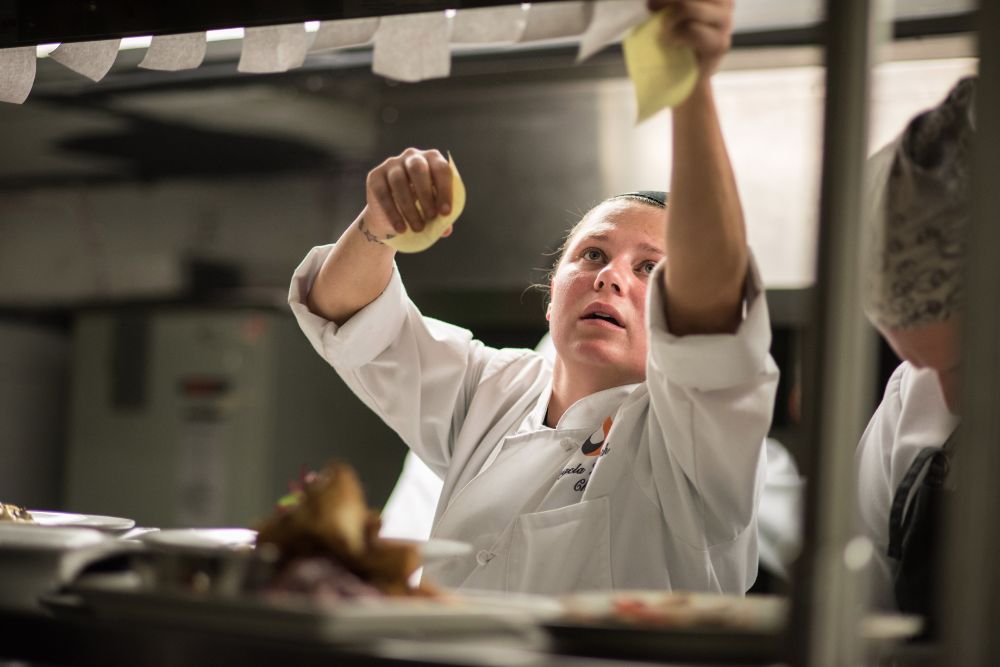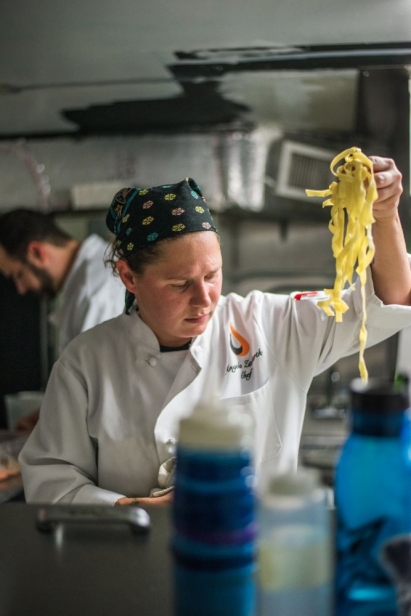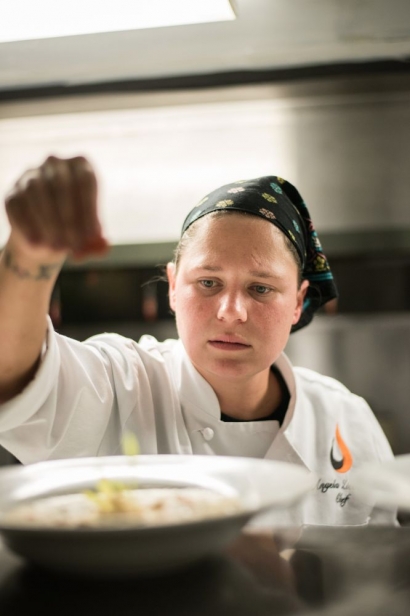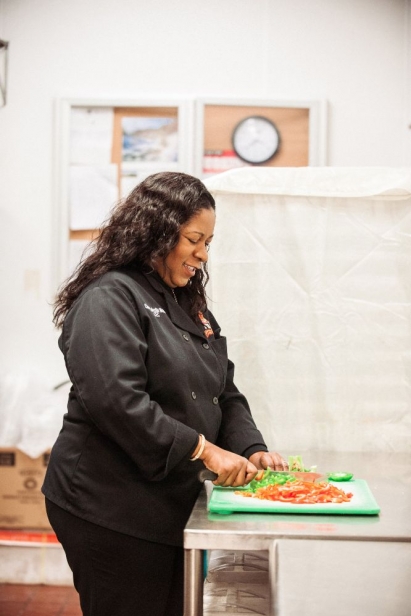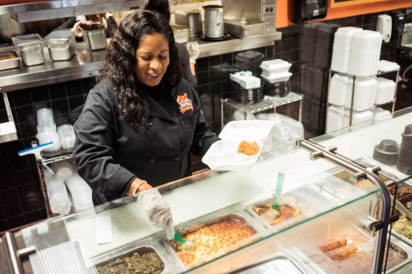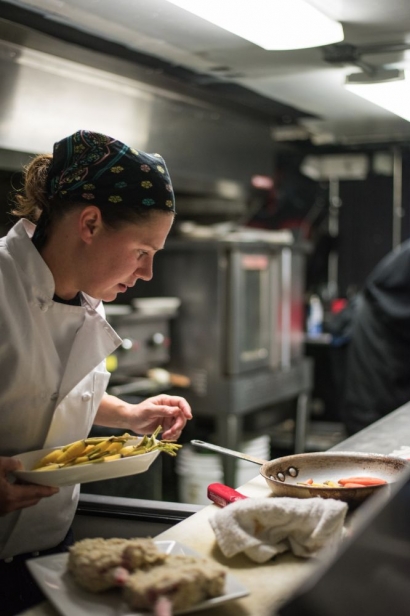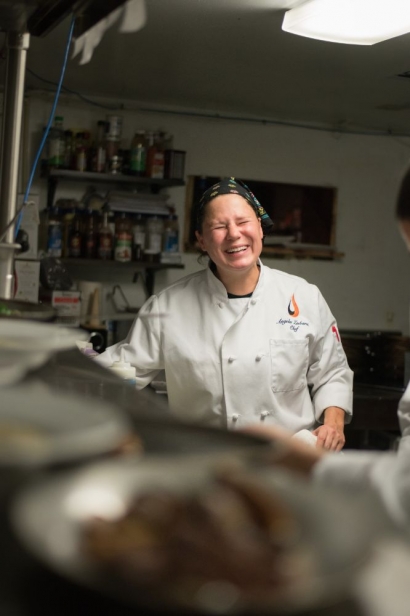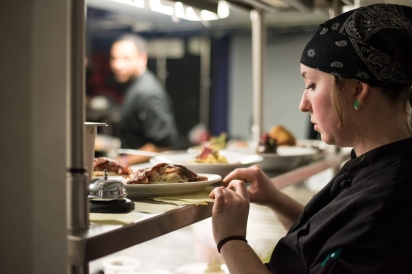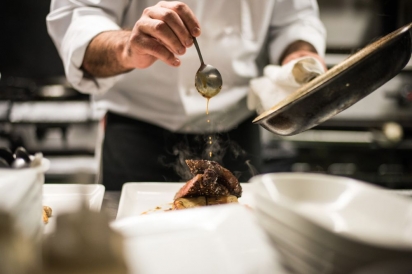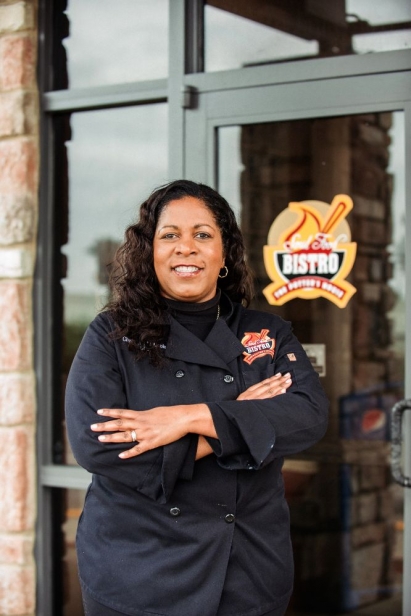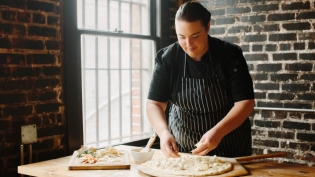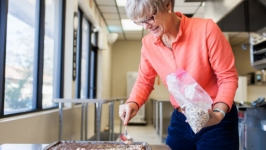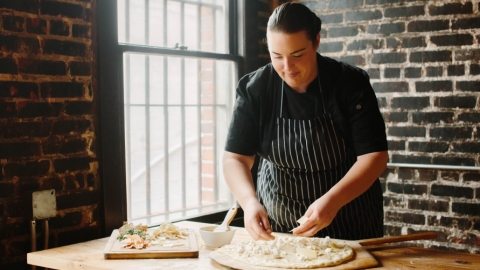Women at the Helm of Professional Kitchens
Women have answered the call of the adrenaline-charged work of the kitchen line and have proven that they are able to hold down such physically demanding positions as sauté, broil and grill with the best of men. It is no secret that being a chef is hard work, and women have established themselves in the kitchen, oftentimes working harder to gain the same respect as their male equivalents.
While women fill the roles of line cooks, executive chefs and restaurant owners just as successfully as their male counterparts, their names are not as familiar to the public nor are they as recognized in the media as frequently as male chefs. Culinary programs such as the James Beard Foundation hand out proportionally fewer accolades and awards to female chefs.
In 2013, Time published its list of who they considered influential food newsmakers: “The Gods of Food.” Of the 13 food influencers listed, five were male chefs but not one female chef was included among the four women on the list. The outcry from female chefs after the article was published was not that there was just sexism in the kitchen, but sexism in food media.
Many women chefs recognize that the bar is higher for them than for their male counterparts and that success is hard won in the kitchen and in the media. But they still continue to cook.
According to the 2014 U.S. Department of Labor women in the workforce report, of head cooks and chefs employed in food service establishments, 21.4% are women. However, according to 2013 data, 40% of the workforce employed as cooks are women. With strong workforce numbers many would assume that women would be quickly rising in the ranks. But in a 2014 article by Bloomberg Business, “Women Everywhere in Food Empires But No Head Chefs,” Bloomberg’s own data showed that women only made up 6.3% of head chef positions in 15 of the leading restaurant management companies.
So how are we doing in our region? In Northeast Florida, women chefs are still in the minority, but several are making their mark and doing it well in some of the area’s favorite restaurants.
Celestia Mobley, executive chef of Potter’s Soul Food Bistro, started out in the banking industry. She was doing well in her position, but the bank was bought out and Mobley’s position moved to Texas. So she cashed in her 401(k) and opened her own seafood to-go counter on the Westside. “It was small. I did garlic crabs and such and I was busy.” But Mobley eventually gave up her to-go counter. She had a 5-year-old daughter who had to sit in the restaurant’s office from the time school let out to when Mobley closed the shop for the day. It was not a quality of life that she wanted for her daughter. When she went to her pastor at The Potter’s House Christian Fellowship of Jacksonville for advice, he offered her a job instead, at the Soul Food Bistro.
“I took it over at 900 square feet. Soon, the pastor was looking at buying a location at the Normandy Mall and expanding the restaurant to 5,000 square feet. Then expanding to a second location.”
Being a woman running a large restaurant and managing employees hasn’t always been easy. Mobley admits she has had to prove herself to her employees at times. But that is her management philosophy. “I never ask an employee to do something that I wouldn’t do myself,” she says.
Angie Ziebarth, executive chef at Balefire Brasserie in St. Augustine, always wanted to be a chef. She started as a truck stop breakfast cook at 14, then attended Sullivan University, Louisville, on a scholarship and earned an associate degree in baking and culinary arts. She worked at Seviche, Louisville, for five years and a few other fine-dining restaurants in the area. But she wanted to open her own restaurant, because working for chefs is tough. She, along with boyfriend Todd Gatterdam and his friend Tony Massingill, decided to open a restaurant on Anastasia Island.
Ziebarth is not really interested in being recognized exclusively for her gender. She just wants everyone in the kitchen to be on an equal playing field. “Depending on the restaurant you work at, line cooks, pantry and prep cooks are not really recognized by the customers and the media,” she says. “Most of the time the executive chef or executive sous-chef are the only ones in the forefront.” And with the majority of females in kitchens as line cooks, pantry or prep, and not moving up in the industry, “women don’t get as much attention. And that is not really fair. Everyone is a team in a kitchen,” Ziebarth says.
“Coming up in the industry was hard,” says Ziebarth. “It is so male dominated and women are just now finally pushing through.” Working with men you definitely need more “umph,” she admits. She remembers the night that she finally got respect for her cooking abilities at Seviche. An expected slow night got hit with over 200 covers. She was sauté and along with the sous-chef and one other cook, Ziebarth’s little sister Megan, they pushed through together for a great service. She felt that her boss Anthony Lamas, executive chef/owner of Seviche, and her team members treated her with more respect after that night.
Jenny Selden, executive sous-chef at HobNob Restaurant, attended the University of Minnesota to be an engineer. After her first year in college, she was unhappy and decided to drop out and enroll in the culinary program at St. Paul’s Community College to learn how to bake bread. Then she discovered the savory side of cooking and was hooked.
Selden has worked in Jacksonville for most of her career, with stints in Savannah and Los Angeles. She was at Biscottis for eight years and was executive chef from 2004 to 2008. She also worked at Pastiche and helped open BB’s. Her next big gig was at Belfair Country Club in South Carolina, where she worked under female executive chef Shelley Cooper. Selden then followed Cooper to Los Angeles, where investors wanted to open a highly stylized upscale Southern cuisine concept. She worked at it for 10 months, but the food and the concept weren’t working and Selden quit along with several others including the executive chef, Cooper. She jumped around a bit in corporate chef gigs trying to find her place again in the industry.
Selden was lured back to Jacksonville after a few investors wanted to revive a version of the shuttered Pastiche. But Patio at Pastiche closed its doors after four months and she took a position as executive sous-chef at Black Sheep. Now she is the executive sous-chef at HobNob, a new restaurant in Unity Plaza. And throughout her journey she always did well in her positions because she believes in working hard in the kitchen.
“The most successful women chefs I know are badasses in the kitchen. You have to be better than the man next to you to get the same level of respect,” she states. “It is an old-school boys’ club that is hard to break through.”
Twenty years ago when Selden was coming up, she felt that it was more acceptable for women to work in pastry because it was considered the more civilized route for women. But she was drawn to savory because it is not as lonely and exacting. If a mistake is made in savory, it is easier to fix or it can be a happy accident. “If I work with girls that act like little girls and set me back 20 years, it makes me upset,” Selden says. “I can’t stand that. Come in the kitchen and get ready to work.”
She feels like Food Network has romanticized the job of chefs and cooks and elevated the celebrity of being a chef. “What we do is not romantic,” Selden says. “It is dirty and disgusting and laborious. If you are not willing to do what you need to do in this industry then you are not going to make it.”
Selden agrees that for most restaurants, the executive chef is the face of the business to the customer and media, and since significantly less women hold that position, they don’t receive as much attention from the media.
Mobley also points outs that when women do become executive chefs the reason they still don’t receive as much recognition is because female chefs are too busy—especially if they have a family—to seek out media attention and compete on shows like Bravo TV’s “Top Chef.” Because women tend to be nurturers, being in management can be difficult for them too, says Mobley. It is challenging for women at times to extract themselves from fixing their employees’ problems. But once women find the right balance, it is rewarding because they are making positive changes in a person’s life.
Now that Mobley’s daughter has grown up, Mobley has been able to focus more on her professional development. She earned an associate degree in culinary management from Florida State College, Jacksonville, and became a certified executive chef. Her first cookbook, Southern Goodness, was released in early 2015.
Ziebarth refuses to conform to the lifestyle the culinary industry has dictated and chooses to make it fit her life. She raises a 2-year-old son surrounded by a supportive family and works on a schedule that allows her to be both a mother and a chef.
“Women can work in this industry and be successful,” says Ziebarth. “All you need to do is be strong and hold your head high.”
“It is better than it was 20 years ago,” says Selden. “But you have to take yourself seriously in the kitchen first, because no one else will until you do.”


